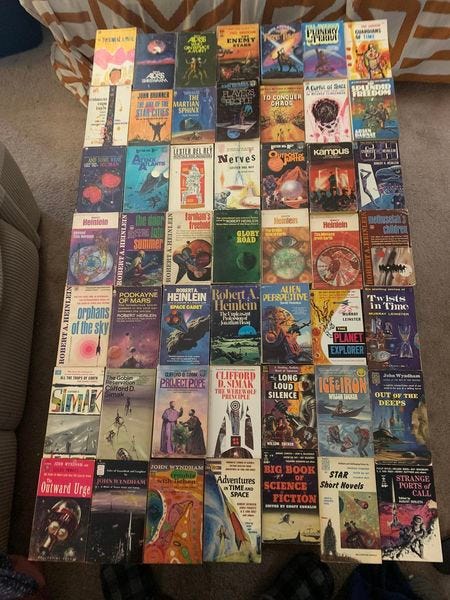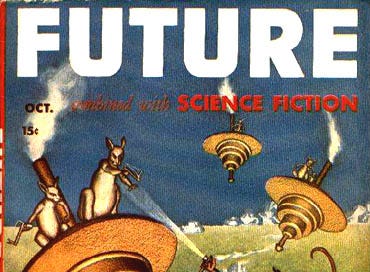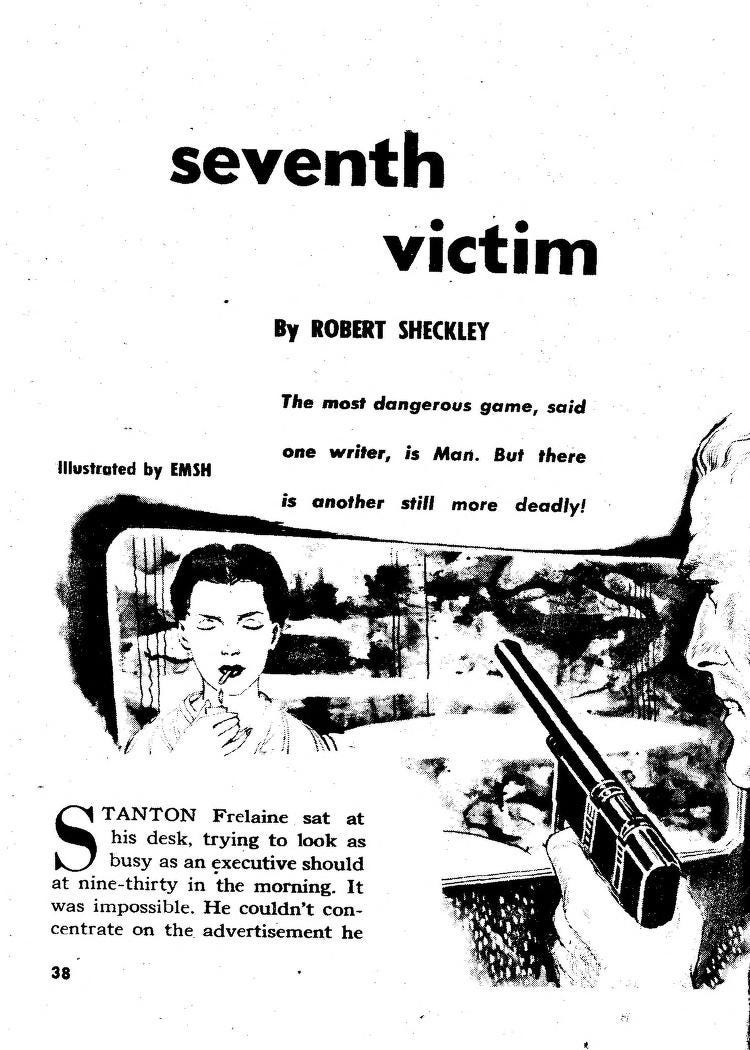Better late than never! This week’s installment of the Official William Emmons Books Newsletter comes to you four days later than I would like it to thanks to me being a one man shop and spending my time focused on some other profit centers of my business. If I owe you a Facebook message on a matter unrelated to a sale, I promise I am aware of it and have not forgotten you.
This week I’ve only been reading very slowly in Terry Bisson’s A Voyage to the Red Planet but have managed to take in a number of episodes of the Lost Sci-Fi Podcast, so in lieu of a Reading Diary, we’ll have a…
Listening Log
I usually listen to episodes of the Lost Sci-Fi Podcast featuring stories by relative no names in part because I’m saving the authors whose names I recognize as a special treat. This week I decided to indulge and let myself listen to stories by Damon Knight, C.M. Kornbluth, Frederik Pohl and Donald A. Wollheim all of whom were members of the Futurians, a left-leaning New York fan organization of the 1930s and 40s that produced some of 20th century American science fiction’s most important figures. Once I ran out of Futurian stories to listen to, I listened to a story by Robert Sheckley.
Futurian Feasts
I listened to too many of these to give each of them a proper review. Some were very enjoyable or had an interesting point. In particular, I liked Damon’s Knight’s “The Beachcomber” (Imagination, Dec. 1952) which was sort of a sideways take on space/time opera and there was some real meat to C.M. Kornbluth and Frederik Pohl’s “The Engineer” (Infinity Science Fiction, Feb. 1956) more about which below.
I also listened to a few more Pohl stories that were technically pretty good but didn’t interest me the way his collaboration with Kornbluth did. They were “A Hitch In Time” (Thrilling Wonder, June 1947), a time opera short with a surprise ending; “The Hated” (Galaxy, Jan. 1958) about a psychological treatment given to astronauts in order to make them not kill each other in close quarters; and “Asteroid of the Damned” (which ISFDB says was co-authored by Dirk Wylie) (Planet Stories, Summer 1942), a crime story set on a relatively lawless asteroid with funny aliens. Of these, “Asteroid of the Damned” was my favorite because of the funny aliens.
The two by Donald A. Wollheim I listened to don’t fair as well in comparison to the others but I ended up liking one of them. “The Planet of Illusion” (Comet, March 1941), about a planet in another dimension so vast you can see it but not touch it in ours, gets a negative reference from me. I was going to give the other one “Pogo Planet” (Future Combined with Science Fiction, Oct. 1941) a neutral reference but I liked it despite myself. It was comical science fiction adventure where the protagonist is a heel. I wanted to dismiss it as juvenile but the more I sat with it, the more it stuck my ribs. To get the drift of the story and why it sits well, just scroll up and look at the cover at the top of the newsletter. Kangaroo men chasing a guy on a giant termite! Still it’s not good science fiction.
“The Engineer” by C. M. Kornbluth and Frederik Pohl
This one is basically a character study cum future history about a high level manager working an undersea oil rig. He is trained as an engineer but hasn’t done the work of one in a long time because he has concluded that managing men and being a political operator is more important than actual engineering. As the story opens, his team is faced with the crisis of a leak that could potentially flood their workplace. He tries to enforce calm, bans anyone from leaving the oil rig or contacting higher ups in the company, and sends his underlings off to deal with the situation.
Instead of taking action himself, he allows himself fifteen minutes to read a history book. We get a picture of how Mexico defeated the United States in a war reclaiming the territory it lost in the 19th century. The book posits that the culprit was the rise of a type of American general who was more of a political operator than their predecessors who militarily defeated the Third Reich and the socialist countries. They were pulled in many directions by all sorts of interest groups and took actions meant to appease the populace rather than to win wars. At the end of fifteen minutes, the manager puts down his book and thinks it is interesting but that he doesn’t really buy the thesis about political generals. The story puts a fine point on that the manager is himself a political general before having him die when his office is flooded.
I have at least two thoughts about this. One is a kind of surface observation that this story was published during the first Eisenhower administration. The second is that the story evinces a skepticism about liberal democracy that comes across as more anti-democratic than anything. Instead of politicians, do we really need resolute technocrats who take action without consideration of public opinion? This might be your brain on science fiction. I’ll admit there’s also a critique of the fatuousness of managerial types who are interested in pleasing their higher ups. I just don’t know what the alternative to politics is.
“Seventh Victim” by Robert Sheckley
In general, I don’t buy into the cultural norm that spoilers spoil, especially not in science fiction literature. In more melodramatic literatures like superhero comics, spoilers can mess you up I guess. But science fiction is mostly about ideas, so having those explicated a little beforehand can only make you want to read the story more. In any event, this one is the rare science fiction story where I feel compelled to withhold the plot from you because there’s some real drama to it. Go listen to Scott Miller’s recording of it or read it in the April 1953 issue of Galaxy Science Fiction. It’s the good stuff.
I will tell you about it’s underlying premise and the so-called science behind it. The idea is that in the future people will be able to kill each other in licensed hunts. One applies to a governmental bureau of catharsis and is assigned a victim. You are allowed to kill your victim with a small arm. Your victim is allowed to fight back and kill you. If you survive the hunt, you in turn have to serve as someone else’s victim.
Now, this is an interesting set up for a science fiction story but when Sheckley drops the social scientific and psychological explanation for the hunts, you realize there is some real normie middle brow dumb “smart guy” shit going on. After World War IV, the authors of the peace realized that man must never be allowed to go to war again. Very good. Very good. But they also realized that it is in the nature of men to want to kill and that what makes man great is in part his desire to kill. So to prevent another war and protect the greatness of men, they must be allowed to kill each other in licensed hunts. Each of the countries that was a part of the peace is required to have them by international treaty. This sort of elides that every war going back to caveman days has been about resources and territory and suggests instead that countries go to war because men are just that way.
The story doesn’t really go deep on the question of human nature other than an implied interrogation of the differences and similarities of men and women. It also presents a world exactly like 1950s America except that there are blood sports and licensed killing and in so doing presents a picture of some kind of dark underbelly of the real 1950s. I’m starting to think a lot of the best science fiction of the 1950s is really about the cruelties and vapidities of the middle classes.
Memorial Day $2-3 Sale and More
Before diving into the sale I want to draw your attention to some things I have for sale on eBay and Facebook.
I am once again inviting you to check out my ever expanding eBay store. There are all different kinds of genre fiction books for sale there but my center piece right now are some lots of vintage science fiction digest magazines. In particular, I’ve listed some inexpensively priced sets of somewhat damaged reading copies of Galaxy and If from the 1950s and some also inexpensive but better quality sets of The Magazine of Fantasy and Science Fiction from the 1970s. If you are interested in the kinds of stories I’ve been reviewing in this newsletter and seeing what they were like in their original magazine formats the Galaxies and the Ifs are good choices. I think I have these items priced fairly and competitively but I’m open to reasonable offers either via this platform or eBay.
Over on Facebook, there are some vintage Westerns, some jungle adventure pulp reprints and of course some 1950s science fiction paperbacks that I offer up for your consideration.
Now on to the big sale I teased! Below are 48 books I am offering for $2-3 plus S&H (media mail plus $1). Read on for details.

I offered these books for sale on Facebook back on May 15 for my usual price of $5 for 1, $20 for 5. I don’t have to sell these online because I have a bunch of table fairs coming up this summer but I wanted to give my readers and subscribers a crack at them and it has been a while since I have offered you all a special deal. Here is how everything is priced—
$2 — Books by Arsen Darnay, James E. Gunn, Robert A. Heinlein, David Houston and Wilson Tucker.
$3 — All other books.
Plus S&H (media mail plus $1). Limited supply. First come first served. You can see more and better pictures of the books here.




